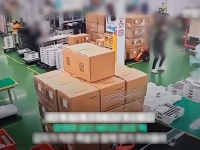Aricell Lithium Battery Factory Fire in South Korea Kills 23 Workers

Public CCTV footage of Aricell fire.
An explosion at Aricell’s lithium metal battery factory in Hwaseong city in South Korea killed 23 workers in late June 2024. Most of the dead were low paid and undocumented female migrant workers from China who had not received properly training in industrial safety, according to their family members.
One of the women who died was Bie Limei, a 37 year old ‘joseonjok’ (an ethnic Korean person who grew up across the border in China) from the city of Yanbian.
“She didn’t understand a thing about the explosions,” Ju Haiyu, mother of Bie, told National Public Radio in the U.S. “If she had had proper training, how could she not know what to do? If she knew what to do, wouldn’t she have run away, right?”
Aricell is majority owned by a company called S-Connect, which in turn supplies Samsung SDI, a battery company owned by the conglomerate Samsung. It makes lithium metal batteries (which are different from rechargeable lithium-ion batteries) used in radio and communication devices.
While lithium batteries are generally safe, they are prone to catching fire if not handled correctly: For example, if they are charged incorrectly, if they come under pressure (such as during a vehicle crash) or even if they swell up over time through normal use.
"Battery materials such as nickel are easily flammable," Kim Jae-ho, fire and disaster prevention professor at Daejeon University told Reuters. "So often, there is not enough time to respond, compared to a fire caused by other materials."
At the Hwaseong plant, some 35,000 batteries were being packed for storage on the second floor of a building that was insulated with plastic. After one battery caught fire, it quickly ignited nearby batteries which also exploded causing the whole warehouse to go up in flames.
“The smoke was so toxic you could lose your consciousness after taking one or two breaths,” Cho Seon-ho, a senior fire official told a news briefing. Initial investigations showed that this was the primary cause of death.
Park Soon-kwan, Aricell CEO, apologized for the accident. "We will be conscientiously taking part in the investigation by authorities and will do our best to determine the cause of the accident and to take measures to prevent a repeat of such an accident," he told reporters. He claimed that the company provided safety manuals in Chinese and Korean to the workers and conducted regular safety trainings.
Under a new law, Park faces at least a year in jail or a fine of one billion won (US$725,000) if the investigators into a deadly industrial accident determine that the company did not correctly implement safety measures. (At least one CEO has been jailed under the law to date.)
Despite the fact that Aricell did not have permission to hire migrant workers, according to sources interviewed by the Korea Herald. Park has attempted to shift blame to a recruitment agency that supplied the workers to the factory, stating that it was their job to provide safety training.
"It is highly suspected that this is a case of illegal hiring of foreign workers aimed at gaining cheap labor without appropriate safety measures," Kim Sung-hee, a professor at Korea University Graduate School of Labor Studies, told the Korea Herald. “The ratio of foreign workers at Aricell shows that it's a company that depends heavily on foreign workers.”
Indeed, out of the 23 victims, 18 were Chinese nationals (15 were female). By comparison, just one in five temporary workers in South Korea hails from China, according to official Korean government data in 2023.
Labor advocates say that undocumented migrant workers like the Aricell victims are often heavily exploited. “We work in anxiety because we work in unsafe workplaces,” Udaya Rai, a Nepali citizen and president of the Seoul-Gyeonggi-Incheon Migrants’ Trade Union (MTU), told reporters at a memorial for the victims held at Hwaseong city hall. “What migrant workers fear the most is whether they’ll be able to leave the country alive.”



